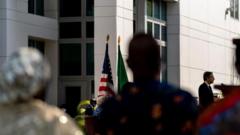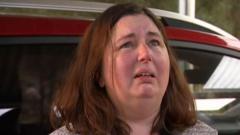As elections loom in Australia, voters prioritize economic concerns over political dynamics with global superpowers. Prime Minister Anthony Albanese and opposition leader Peter Dutton both recognize the pressing need for solutions to the nation's cost-of-living crisis, reflecting a shift in focus from broader international relations to local economic stability.
Economic Struggles Take Center Stage in Australia's Upcoming Elections

Economic Struggles Take Center Stage in Australia's Upcoming Elections
Australians are set to vote amidst significant economic challenges, including inflation and housing affordability, with both parties facing pressure to address these issues.
Voters in Australia prepare for a pivotal election on Saturday, with pressing concerns about the rising cost of living and a persistent housing crisis overshadowing the political landscape. The country finds itself in a particularly challenging position as it seeks to balance its security reliance on the U.S. while engaging in significant trade with China, particularly in light of recent global tensions.
On the ballot are two central figures: current Prime Minister Anthony Albanese of the center-left Labor Party and opposition leader Peter Dutton from the conservative coalition. Both candidates acknowledge that navigating the current economic environment is crucial, especially as inflation continues to threaten household budgets and make housing more unaffordable.
As citizens head to polling places, opinion polls suggest that Albanese may secure a second term, a notable shift from earlier months when the opposition appeared to have the edge. This nuanced Westminster-style parliamentary system has increased the significance of voter sentiment toward tangible economic outcomes rather than just political rhetoric.
Dutton's camp has taken a proactive approach, emphasizing tax cuts aimed at reducing fuel prices, using frequent stops at gas stations to reinforce their stance. In contrast, Albanese has focused on healthcare, aiming to assure voters that healthcare costs will see a reduction under continued Labor governance, which heavily leans on Australia's universal health care system, Medicare.
While pressing global issues garner attention, it is unmistakably the “bread-and-butter” concerns of everyday Australians that shape electoral discussions. Voters voice their frustration over stagnating wages and soaring living costs, leading to skepticism about the candidates’ proposed solutions. Both political parties have responded with modest proposals, which many Australians feel lack the boldness necessary for substantial change.
Overall, this election serves as a reflection of the broader global economic climate, yet it also highlights a critical moment for voters who are looking for leaders capable of addressing immediate domestic challenges while skillfully managing complex international relationships.





















